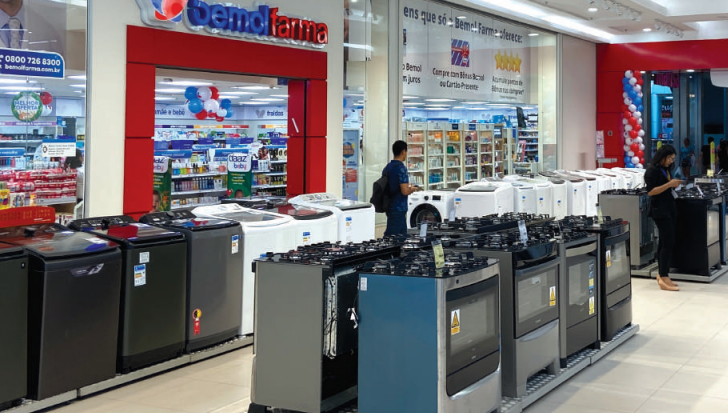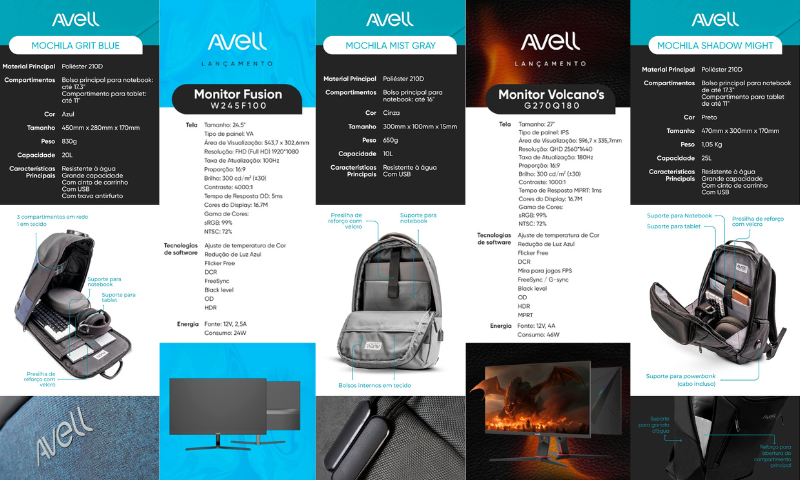
Cover Story / Grupo Bemol
GRUPO BEMOL: CHALLENGES AND OPPORTUNITIES IN THE AMAZON
Operating in a region with many peculiarities, including complex logistics involving the transportation of products by sea, river, and land, as well as a commitment to sustainable growth, Bemol projects an estimated revenue of approximately BRL 4.5 billion for this year.
by Igor Lopes

Grupo Bemol is a true icon of retail in Western Amazonia. Founded in Manaus (AM) by three Moroccan immigrant brothers, it began its journey in 1942 as a distributor of pharmaceuticals but quickly reinvented itself upon recognizing the opportunities presented by the Free Trade Zone of Manaus. From then on, Bemol established itself as a key player in the sale of electronics, furniture, and diverse solutions that meet the region’s needs.
Marcelo Forma, CFO and commercial director at Grupo Bemol, discusses in this exclusive interview with Eletrolar News how logistics is a delicate issue in the northern part of the country. It is essential to navigate barriers and develop solutions to adapt to the peculiarities of the Amazon market, while maintaining a solid connection with the local community and seeking innovations that meet consumer demands and promote sustainable development.
“The Amazon is at the center of the world. All issues related to sustainability are discussed all the time to look at the future of our planet. We have a very strong connection with this topic, and it involves several actions.”
How did Grupo Bemol connect with the Amazon community?
MARCELO FORMA – Western Amazonia comprises four states: Amazonas, Rondônia, Roraima, and Acre. This is roughly half of the Amazon. In terms of Brazil, we are talking about 26% of the territory, but with only 4% of the population. There are 8 million people, and if we consider GDP, it represents only 2.5%. It’s a corner of Brazil with a very low population density. Our strategy is, in fact, to occupy and specialize in these four states. Bemol’s main business is in electronics and furniture, but over the last few years, especially due to the retail apocalypse, we have made a series of innovations and diversifications, guided by our strategy to create an ecosystem to participate actively in the customer’s life every day.
How does the group tackle logistical challenges for product delivery?
MF – We are experiencing the second year of a very severe drought. It’s a record. This has been the biggest drought we’ve ever had, isolating many municipalities. So, we face two major effects of the drought from an operational standpoint. The first is inbound logistics. About 35% of what we sell is purchased in the Free Trade Zone of Manaus. The other 65% comes mainly from the South and Southeast regions, with some coming from the Northeast. We manage all this logistics through cabotage, as there are no roads connecting other regions to Manaus. We can’t fly everything, especially when it comes to white goods or furniture. We have consolidation centers in Itajaí (SC), Santos (SP), and Pecém (CE), and every week, ships collect containers from them to bring here. Bemol is probably the company that brings the most products to Manaus. Much of the journey is maritime, but at some point, there’s a river transition. And when drought occurs, restrictions begin. The draft is not sufficient for large ships, and these vessels start to stop sailing. At that moment, we need to seek alternative models.

What kind of models?
MF – This year, we made significant progress in port infrastructure. Now, shipping companies arrive at the port and transship to barges with much lower drafts that can handle the transport. We found a solution, but all of this ends up being more expensive here, and there’s a dry fee that large carriers charge us. To give you an idea, freight costs for a container increase by 70% during this time. This is just for inbound logistics. When it comes to outbound logistics, we have two major operations. One is naturally storing replenishment. There are 62 municipalities in Amazonas. In some municipalities, it takes us two weeks by boat to deliver goods. Some municipalities we only service through e-commerce. There is no dedicated fleet of boats for cargo transport in the Amazon. We have some regional boats that make daily trips to transport passengers and use the hold to carry products. We have already contracted space on these vessels. And when we get into the details, it becomes increasingly complicated.
This is the great peculiarity of your region, right?
MF – Exactly… There’s the boat, but sometimes you also have road and river transport. Sometimes, that barge doesn’t have a port to unload goods in an organized manner. So, we open the truck, remove the products, and often need people to help with the process. It’s a very complex logistics situation. And even though there are 61 municipalities in the interior of Amazonas, the population isn’t concentrated in each one. There are communities surrounding these municipalities. Sometimes, you reach a municipality and need to load a refrigerator onto a canoe to take it to that customer’s community. With the drought, all of this becomes an even greater challenge. To give you an idea, in some cities, the distance to reach water today due to the drought is four kilometers. We used to have a delivery SLA of 10 to 12 days. During drought, we must change that to 30. It’s really a complex task.
“Credit is a great strength of ours. Of the 8 million inhabitants here in the region, we have a registry of 4 million. That’s half of the local population, practically one per household. And today, 85% of the sales we make are through our own credit.”
Do customers complain about the increased delivery times?
MF – There is no alternative model; it’s not even a technological issue. The drought lasts a critical period of three months. Outside of this time, we can provide a much better quality of service. Customers understand this because they live this reality day by day. They even try to plan to avoid purchasing necessities they know they will need during this period.
What is the representation of electronics in Bemol stores?
MF – Today, white goods represent 30% of sales. Cellphones represent 23%. Video products account for 8%. If we consider all categories of electronics, we should be around 70%.

How is technology used in the evolution of work processes in the group?
MF – From a channel perspective, e-commerce is fundamental to our operation. Before the pandemic, we sold 2% through our digital channel. It was very insignificant. Today, we are at 17%, and the volume of sales has also increased. We’ve doubled the size of the company in six years and increased the digital channel’s share eightfold, which is very relevant. The digital channel has allowed us to bring a series of innovations. First, because there are municipalities deep in the Amazon where we don’t have stores. Just to give you an idea, there are 4 million inhabitants in Amazonas, just over 2 million in Manaus. The rest is divided among those other 61 municipalities. Four or five municipalities have around 100,000 to 120,000 inhabitants, but the majority have less than 50,000, many with 10,000 inhabitants.
Does it become unfeasible to have physical stores in all municipalities?
MF – Exactly… So, we started to structure what we call “caboclo e-commerce,” which aims to bring a bit of regionalization and local challenges to develop something that truly meets the local reality. We used to have stores, for example, in the four capitals of the four states where we operate and two cities in the interior of Amazonas. Today, we have stores in 22 cities. Three years ago, we opened a store in Parintins, a city with 100,000 inhabitants that became famous for its festival. It’s doing exceptionally well, but it brings a complicated logistics issue. We also have one in Manaquiri with 15,000 inhabitants. And then people ask, “Why did you open a store in such a small place?” The answer lies in proximity; I can manage logistics a bit more easily. We developed a model we call a hybrid store. It’s about 400 sqm, with 250 sqm for retail and 150 sqm for pharmacy. Let me explain: our typical store standard, which has always existed, has 2,500 sqm of sales area in Manaus. When I go to the interior, I can’t open a store that big. This model is interesting because I can provide local service to offer products immediately to the customer, and they can also purchase via e-commerce. Additionally, in e-commerce, we have been working to develop what we call a regional marketplace. We encourage local entrepreneurs who want to sell products on our platform. This is extremely relevant in the region. In total, we have 38 physical stores, one online store, 48 pharmacies, three markets, five distribution centers, and the Bemol Saúde Clinic.
Is credit also an important issue for Bemol?
MF – Credit is a significant strength for us. Of the 8 million inhabitants in this region, we have a database of 4 million. That’s almost half the local population, practically one per household. Today, 85% of the sales we make are through our own credit system. Only 8% are made with credit cards. We have developed a relationship of trust with our customers by including them in the financial system, as many of them did not have access to credit. In this way, we create a long-term and loyal relationship. That’s why credit is a very important fuel for us. It also becomes a significant competitive differentiator.
“We focus on the innovation that permeates our processes, seeking operational optimization through the application of generative AI. This collective effort reinforces our leadership role in the Western Amazon market.”

What about revenue? What is the projection for 2024?
MF – This year, Bemol expects revenues of approximately BRL 4.5 billion, the result of joint and integrated work between several areas of the company. This performance reflects our commitment to sustainable growth, driven by strategic investments in a larger logistics structure, with the opening of another distribution center, a store in the interior of Amazonas, four pharmacies and the expansion of our financial services. We also focus on innovation, which permeates our processes, seeking operational optimization through the application of generative AI. This collective effort reinforces our leadership role in the Western Amazon market.
How is Bemol implementing sustainability practices in the region?
MF – The Amazon is at the center of the world. All issues related to sustainability are discussed all the time to look at the future of our planet. We have a very strong connection with this topic, and it involves several actions. We have a very long tradition in relation to governance. Our board of directors is extremely well structured. We have been audited by Big Fours for several years. All practices related to governance work very well at Bemol, which helps us in the market and in financial institutions. In the environment, we have the first issue of energy – 100% of the energy we consume comes from renewable sources. We buy a lot of energy on the free market on the condition that it always comes from a renewable source. We are unable to connect all our facilities to the free market. So, today we have three solar plants totaling 10,000 panels. They produce energy for two purposes. One is to power our stores that are not currently connected to the free energy market. And we make part of it available to customers, like Spotify: they rent the panels, and I credit the energy generated there to their account at a much lower cost than if it were supplied by the electricity company. They end up saving around 20%. We also have our own fleet of 200 trucks, and we have started testing with six of them that are electric. In addition, all the carbon we emit through our logistics is offset by a project developed in conjunction with a partner. We took a degraded area and are reforesting it. This means making this land productive and using the labor of riverside families. Food crops such as banana, cocoa, and açaí are planted, and there is a science and a technique for doing this interspersed with timber trees, which can be used for the furniture industry in a certified manner. This generates two types of value: one is the sale of all this production and the other is the carbon credits that are also generated through this recovered area. In the social sphere, the first example is female empowerment. The average female entrepreneurship rate in Brazil is just under 40%. In Amazonas, this rate is much lower. So, we understood that we should equip local entrepreneurs so that they could, in fact, succeed in their businesses. We have two programs in this regard. One of them is “Empreende, Mana”. We selected around 400 clients and ended up with 40. These are people who were chosen to participate in a mentoring program on various topics: finance, marketing, and sales. The teachers are experts who work in our community or management professionals from Bemol. They develop their projects, and we reward them with seed capital. And then we continue to monitor these entrepreneurs to make sure that they are progressing with their projects. The first version was so successful that we repeated it a second time.

You are very involved in social issues and an angel investor in many startups that aim to find solutions for the sustainable economic development of the Amazon. Tell us about some success stories.
MF – We have some investments that are, naturally, through Bemol. But, as an individual, I have also invested in several. For example, there are companies that are making superfoods based on Amazonian products and ingredients. The world is increasingly seeking this type of food. This is the case of “MATA”, which is doing well, selling over a million reais per month. I am keeping an eye on solutions that seek the bioeconomy: how can I use the power of the forest to create a product that can help people improve their quality of life. Another investment is the development of vegan gummy candies, with ingredients from the forest, that are lactose-free and free of any type of chemical. There is a company called “Viva Lá”, which is a conscious and community tourism company that organizes expeditions to explore the riches of the Amazon, for example to Pico da Neblina. There is another company called “Remata”. We have our farm where we started to create this agroforestry system (SAF), in which we really believe, because the forest will not survive if you do not bring prosperity to the riverside dwellers. There are startups that are investing in forest elements for the cosmetics and medical industries. And there is a cool project here, which I don’t know if it will work out, but I love it. Do you know what an ekranoplane is?
I have no idea.
MF – The ekranoplane was created during the Cold War. It is a boat that flies with what we call ground effect, very close to the water surface, so as not to be within radar range, and it has a very interesting property: its fuel consumption is much lower than if it were flying. It is not treated like a plane, but like a boat. And ANAC is very complex, the Navy is easier. So, we want to make a flying boat to travel over the surface of the rivers in the Amazon. On the one hand, it solves the problem of drought, and, in addition, it is a very interesting form of transport, because it travels at 150 km per hour. This changes our logistical issues.

What are your expectations for the future of retail in the Amazon?
MF – The big marketplaces are our biggest competitors, and many of them have infinite pockets. When I said we opened a pharmacy, it was to generate recurrence. When I sell only electronics, I see the customer three times a year. Today, with the pharmacy, I see them eight times. And we are now offering loans with real estate collateral. It is the famous Home Equity, which here in the Amazon is a challenge, because the whole fiduciary issue of real estate regulation is complex. Even so, we are doing well. That is why I talk about the ecosystem. Making the region more productive will give more entrepreneurs the opportunity to do well. This boosts the economy, and we make the operation more profitable. All this here is anchored in the digital account, which has a branch that is our store. Thus, the customer can deposit and withdraw at Bemol’s cash register, seven days a week, whenever they want. In a city in the interior of Amazonas, this becomes much more relevant, because there are no branches with ATMs like in Manaus. All of this creates an ecosystem to provide value to our customers. We are increasingly moving in this direction.

Source: Eletrolar News Magazine – Edition #163





